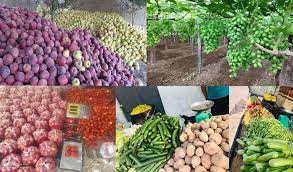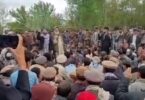GHAZNI CITY (Pajhwok): Some farmers and orchard owners in southern Ghazni province complain the widespread use of the Pakistani rupee has caused them losses. The nose-diving Pakistani currency has been damaging their business, the say, stressing the need for immediate remedial measures.
Grower Noor Ahmad told Pajhwok Afghan News the rupee was commonly used in markets. In the harvest season, they are selling vegetables and fruits in rupees.
Additionally, he explained, there were no cold storage facilities to preserve their produce. If they do not supply their produce to markets, they go rotten.
Ahmad added: “Farmers usually suffer losses during the harvest season due to rain-induced floods, political changes and the closure of crossings by neighbouring countries.
As a result, he continued, farmers had to sell their produce at dirt-cheap prices to prevent them from going rotten.
Their income was thus significantly affected, he said, calling the falling rate of the Pakistani rupee another factor behind their losses.
Samiullah, an orchard owner, said residents of Ghazni were poor and could not afford to purchase chemical fertilizers, fuel and other items.
They usually purchase these items on credit. Now that the rate of the rupee has dipped, farmers are facing huge losses.
Growers and orchard owners have suffered losses running into millions of afghanis due to the low value of the rupee this year, he said.
Samiullah added: “I have sold my produce in Pakistani rupees, whose rate is very low. All farmers have suffered losses and we want the government to pay attention to the issue,”.
Rafand Afghan, an economist, said the unjust division of resources was an important economic issue, fuelling frustration among the people. In a situation like this, he noted, traders were usually happy and made good profits because they have commodities and sell them at rates and in a currency of their choice.
Rafand said: “Inadequate awareness among farmers is another problem. They make transaction in an unstable currency. If that currency loses value, they suffer losses and face trouble.”
Abdul Matin Qalandari, head of the Ghazni Chambers and Investment, confirmed most people used the Pakistani rupee. If the rupee depreciates, the people using it suffer losses.
In the absence of cold storage, they have no option but to supply their produce to the market at low prices, according to the business leader.
Vehicles, land, domestic animals, agricultural products and other items were still sold in Pakistani rupees in Ghazni, he said, asking the government to prevent the use of foreign currencies. When approach by Pajhwok, agriculture and livestock department officials refused to comment on the issue.
However other official acknowledge the continued use of the Pakistani currency in Ghazni.
Hafiz Omar, spokesman for the governor, said the afghani had special value for them and they would take measures to prevent the use of other currencies.
Ghazni is an agricultural province where 80 percent of residents are reliant on farming.







